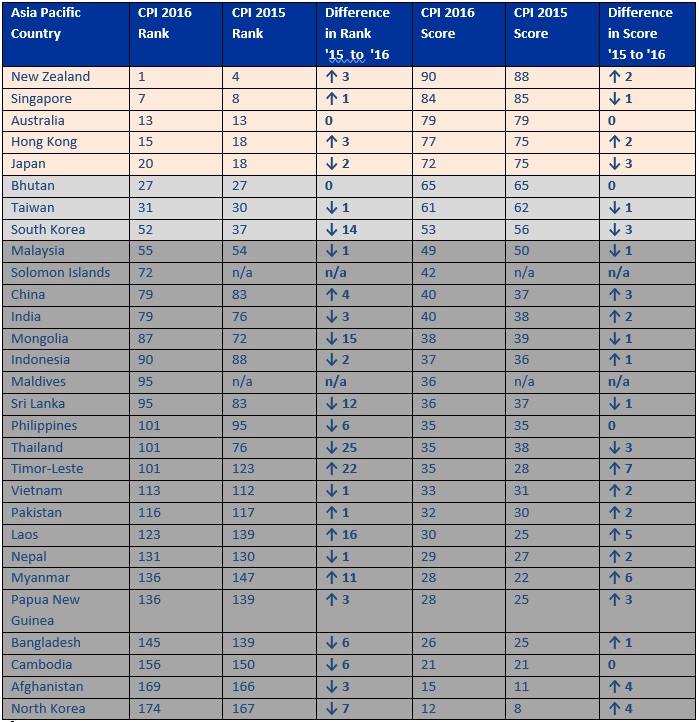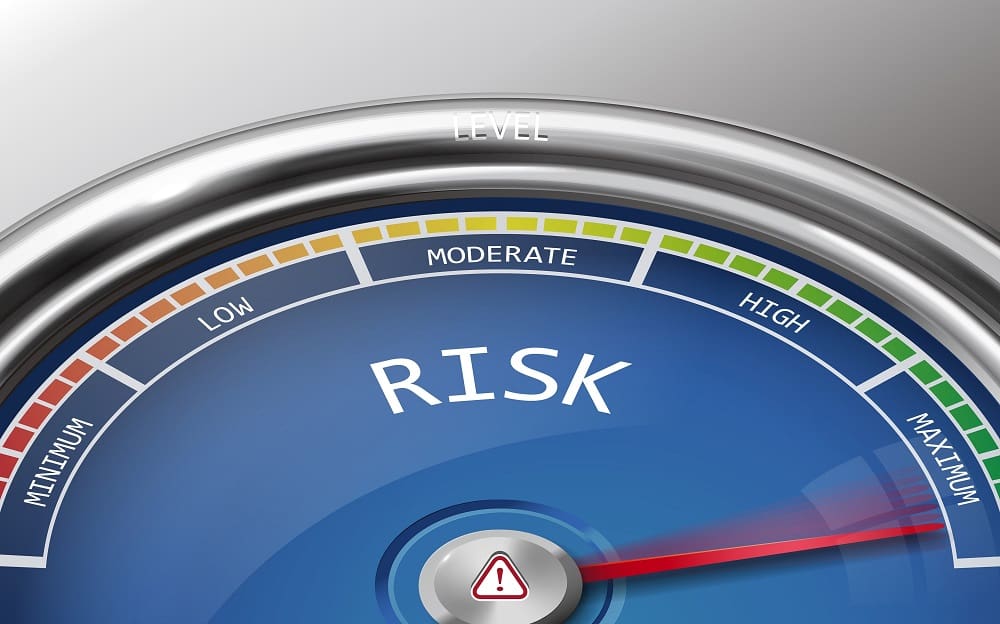Scores Run the Gamut
Each year, Transparency International publishes the Corruption Perceptions Index, a ranking of the world’s nations according to perceived public-sector corruption. Most countries performed poorly in 2016, with the global average score at 43 on a scale of 100. Wendy Wysong and Nick Turner offer an analysis on the Asia-Pacific region.
By: Wendy Wysong and Nick Turner
Transparency International (TI), a global nongovernmental organization, published its much awaited 2016 Corruption Perceptions Index (CPI) on January 27, 2017. This year’s CPI comes amidst a number of high-profile campaigns to stamp out corruption in countries such as India and China, as well as ongoing investigations targeting senior officials in South Korea, Malaysia and elsewhere.
The 2016 CPI, which assessed 176 countries worldwide, showed a mixed picture for countries in Asia-Pacific, with several countries in the region dropping drastically in their rankings from 2015, while others demonstrated marked improvement in their country CPI score over the year. The CPI’s scoring methodology runs from 0 (perceived to be most corrupt) to 100 (perceived to be least corrupt).
Risky Business
Despite some movement in the rankings, Asia-Pacific remains a generally high-risk region for bribery and corruption, according to the latest CPI. There are now only five low-risk and three medium-risk countries in the region, with the remaining 21 categorized as high-risk.
On the bright side, New Zealand tied with Denmark for first place in being perceived as the world’s least corrupt country. However, Asia-Pacific is also home to North Korea, which is perceived as the region’s most corrupt country, ranking just above South Sudan and Somalia globally.
Meanwhile, South Korea plummeted 14 places in the 2016 rankings, with a three-point drop in its country score, placing it within a few points of the high-risk grouping. The decline follows a year of bad news for President Park Geun-hye, who was impeached by the South Korean National Assembly in December, one of a number of business-related scandals to hit the country in recent years.
Most Improved
The major Asia-Pacific climbers in the 2016 CPI rankings include: Timor-Leste (up 22 places), Laos (up 16 places) and Myanmar (up 11 places).
Timor-Leste continued its upward climb, having already gained 10 places in the 2015 CPI rankings. Notably, the country, an observer state in the Association of Southeast Asian Nations (ASEAN), improved its country score by seven points from 28 to 35, making it the most improved country in Asia-Pacific this year.
Laos, an ASEAN member state, strengthened its standing in the CPI rankings after having climbed six places in last year’s index. While the country’s score was static between 2014 and 2015, it improved by five points in 2016.
Myanmar, also an ASEAN member state, was the second most improved country in Asia-Pacific in terms of country score, improving by six points since 2015 under the leadership of the National League for Democracy government, which took office in March 2016. In October 2016, the United States lifted its remaining sanctions against Myanmar in part due to the country’s progress toward democratization after years of military rule, although Myanmar still remains a high-risk jurisdiction for bribery and corruption.
Biggest Falls
This year’s notable falls include Thailand (down 25 places), Mongolia (down 15 places), South Korea (down 14 places) and Sri Lanka (down 12 places).
Thailand had risen nine places in the 2015 rankings, despite a static country score of 38. In 2016, Thailand’s score fell by three points while its ranking fell by 25 places, from 76 to 101. In August 2016, the country voted in favour of a new constitution backed by the National Council for Peace and Order (NCPO), which came to power following a May 2014 coup. Supporters of the constitution have argued that it will help prevent public-sector corruption and allow for a democratic transition; however, critics cite the NCPO’s suppression of political speech as reason for concern.
Mongolia fell 15 places in 2016 after having climbed eight places in last year’s CPI rankings. The country’s score, which was static in 2015, fell by one point in 2016 to a new total of 38.
South Korea fell 14 places in this year’s rankings, taking the country out of the top 50 in terms of perceptions of public-sector corruption. South Korea’s country score fell by three points after having increased by one point in the 2015 CPI. This year’s ranking reflects, in part, the effects of the ongoing corruption scandal embroiling South Korean President Park.
Sri Lanka offered another example of a country that rose in the 2015 rankings only to see its placement fall in the 2016 CPI. This year, Sri Lanka fell by 12 places after having gained two places in 2015, while its country score fell by one point, to a new total of 36.
Honorable Mentions
China continued its ascent, gaining four places in the rankings while improving its country score by three points. China climbed 17 places in the 2015 CPI. While China still remains a high-risk jurisdiction for public-sector corruption, the sustained improvements suggest the country’s well-known anti-corruption drive is paying dividends in terms of perceptions, as measured by the CPI.
India tied with China for 79th place after falling three places in the rankings while improving its country score by two points. President Narendra Modi has taken steps to tackle bribery and corruption in India, including by waging a campaign against “black money” tied to bribery, tax evasion and other crimes.
Malaysia’s country score fell by one point to a new total of 49, causing it to fall into the high-risk grouping. The drop coincides with allegations of corruption against Prime Minister Najib Razak and other public officials in connection with the 1MDB state investment fund throughout 2015 and 2016. Malaysia dropped by one place in the CPI ranking to 55th place.
Among the region’s low-risk countries, Singapore and Hong Kong both climbed modestly in the global rankings, by one and three places respectively, while Japan fell two places and saw its country score dip by three points. Australia’s ranking and overall country score were unchanged between 2015 and 2016.
Conclusion
The 2016 CPI assessed the perception of public sector corruption for 176 countries and territories (compared with 168 in 2015 and 175 in 2014). The changing number of countries over the years makes it difficult to draw a straight trend line, while a small drop in country score can lead to significant movement in the rankings. Accordingly, companies operating in the region may find that a country’s raw score and its placement within the low-, medium- and high-risk groupings are more straightforward indicators of perceived levels of corruption than relative rankings.
Recent high-profile anti-corruption cases demonstrate that the risk is real for companies doing business in Asia-Pacific, even in the region’s most advanced economies. Companies doing business in the region can have a positive effect on market practices through the adoption and enforcement of strong internal anti-bribery and corruption policies and procedures reasonably designed to uphold international standards.
Doing so will also help in managing compliance risks, protect reputations and business interests and avoid costly and damaging enforcement cases at home and abroad.
Full Asia-Pacific Rankings




 Wendy L. Wysong is a partner at
Wendy L. Wysong is a partner at 






